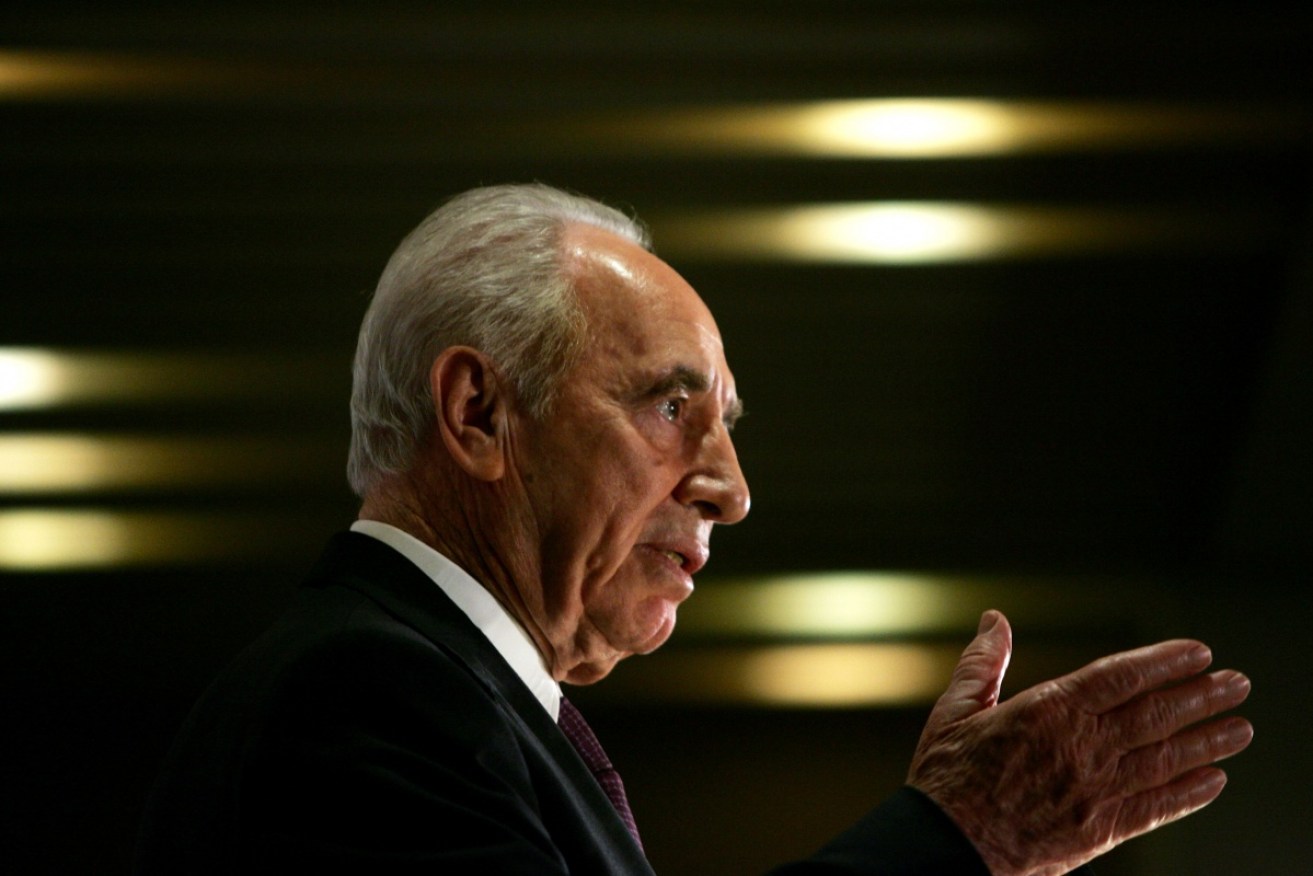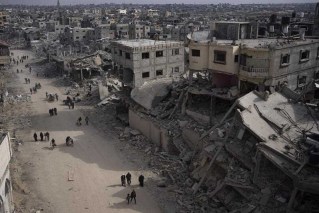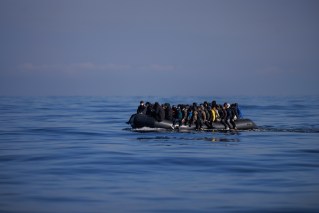Shimon Peres: The last of Israel’s founding fathers


Simon Peres, a towering figure in Israeli politics for decades, has died at age 93. Photo: AAP
Shimon Peres was the last of Israel’s founding fathers, a man who did more than anyone to make the fledgling nation a formidable military powerhouse, and was then recognised for his commitment to establishing an enduring peace with its Arab neighbours.
The 1994 Nobel Peace Prize laureate died on Wednesday (AEST) after suffering a stroke two weeks ago. He was 93.
In his seven decades of public service to the State of Israel, Peres served as president, prime minister (twice), defence minister, foreign minister and in eight other ministerial positions.
In many ways, his story is the story of Israel.
The journey from Poland
Born Szymon Perski in the small village of Wiszniew, Poland (now Visnieva, Belarus), Peres was the son of a lumber merchant.
His parents were not Orthodox Jews, but as a boy he was taught the Talmud (the central text of Jewish law and commentaries) by his grandfather and became a strong adherent of the faith.
After his father Yitzhak moved to the British Mandate of Palestine in 1932, the Peres family – including the 11-year-old Shimon – followed, and he attended school in Tel Aviv, and later an agricultural high school in Ben Shemen. He worked on a kibbutz (agricultural commune) and became involved in politics at the age of 18 when he was elected secretary of a Labour Zionist movement, Hanoar Haoved Vehalomed.
He joined the Zionist struggle in the 1940s and while hitchhiking met David Ben-Gurion, who would become Israel’s first prime minister.
In 1944, at Ben-Gurion’s urging, Peres led a small reconnaissance group to survey the Sinai Desert and make maps that would become key strategic assets during the 1948 War of Independence.

Peres, pictured in 1963, served twice as the Prime Minister of Israel. Photo: Getty
During that mission a friend reportedly sighted a nest of eagles, “peres” in Hebrew. “Persky,” he said, “why don’t you change your family name to Peres?”
In 1947 Ben-Gurion put Peres in command of manpower and arms for the Haganah, the predecessor of the Israel Defence Forces.
Peres secured a agreement with France to supply Mirage jet fighters and also set up Israel’s secret nuclear facility at Dimona.
During and after the War of Independence, Peres served as head of the naval services.
Peres was elected to the Knesset (Israeli Parliament) in 1959, representing for the Mapai party, the forerunner to what would become the Labour movement in Israel, and was appointed deputy defence minister.
But in 1965 he resigned after being implicated in an investigation into Operation Susannah, a 1954 Israeli plan to bomb British and US targets in Egypt in the hope of influencing Britain not to withdraw its troops from the Sinai.
A review of the original inquiry into the operation found inconsistencies in the testimony, and Peres, together with Ben-Gurion, left Mapai to form a new party.
When Golda Meir resigned as prime minister in 1974 after the Yom Kippur war, Peres unsuccessfully jousted with Yitzhak Rabin for the vacant post.

Nobel Peace Prize laureates Yasser Arafat and Yitzhak Rabin.
The negotiator
Peres briefly served as the unofficial acting prime minister in 1977 when Rabin stood down as party leader after a currency scandal involving his wife – a quirk in the Israeli constitution meant Rabin could not resign as prime minister.
His party was defeated by the Likud party under Menachem Begin later that year.
Peres later served his first official tenure as prime minister in the national unity government from 1984 to 1986, based on a rotation arrangement with Likud leader Yitzhak Shamir.
In 1992, Peres failed to win the leadership of the Israeli Labour Party after being defeated in the preliminary stages of the contest by Rabin, and was again appointed foreign minister.

Yitzhak Rabin (L), sitting next to Shimon Peres in the Knesset in 1992. Photo: AFP/Getty
It was in this role that Peres began secret negotiations with Yasser Arafat and the Palestine Liberation Organisation, leading to the historic Oslo peace accords of 1993.
A central plank in the agreement with the PLO was self-government in Gaza and in part of the West Bank, both of which were occupied by Israel.
The accord was signed in a ceremony on the White House lawn.
“What we are doing today is more than signing an agreement; it is a revolution,” Peres said at the ceremony. “Yesterday a dream, today a commitment.
“Let all of us turn from bullets to ballots, from guns to shovels.
“If you have children,” he said, “you cannot feed them forever with flags for breakfast and cartridges for lunch. You need something more substantial. Unless you educate your children and spend less money on conflicts, unless you develop your science, technology and industry, you don’t have a future.”
For the first time the Palestinian leadership officially acknowledged Israel’s right to exist.
Peres, Rabin and Arafat would become joint winners of the 1994 Nobel Peace Prize “to honour a political act which called for great courage on both sides, and which has opened up opportunities for a new development towards fraternity in the Middle East”.

Peres would leave public life a much-beloved figure.
Prime minister a second time
Peres’ second term as prime minister came in the wake of the assassination of Rabin on November 4, 1995.
During his term he oversaw the withdrawal of Israeli forces from Lebanon after a highly controversial invasion, and he became the first Israeli prime minister to seriously tackle the nation’s fundamental economic problems and spiralling inflation.
He was replaced by Likud leader Benjamin Netanyahu in the May 1996 election.

Pope Francis embraces Shimon Peres at Ben Gurion airport in 2014. Photo: EPA
In 2007 Peres was sworn in as Israel’s ninth president – the first former prime minister to hold the largely ceremonial post – and remained in the role until 2014, just two weeks shy of his 91st birthday, the world’s oldest head of state.
For someone who developed a reputation over several decades as an at-times ruthless back-room dealer, Peres ended his years in public office as a remarkably beloved figure.
He observed: “For 60 years, I was the most controversial figure in the country, and suddenly I’m the most popular man in the land. Truth be told, I don’t know when I was happier, then or now.”
Peres and his wife, Sonia, who died in 2011, have three children, eight grandchildren and numerous great-grandchildren.
-with BBC, New York Times and Jerusalem Post








